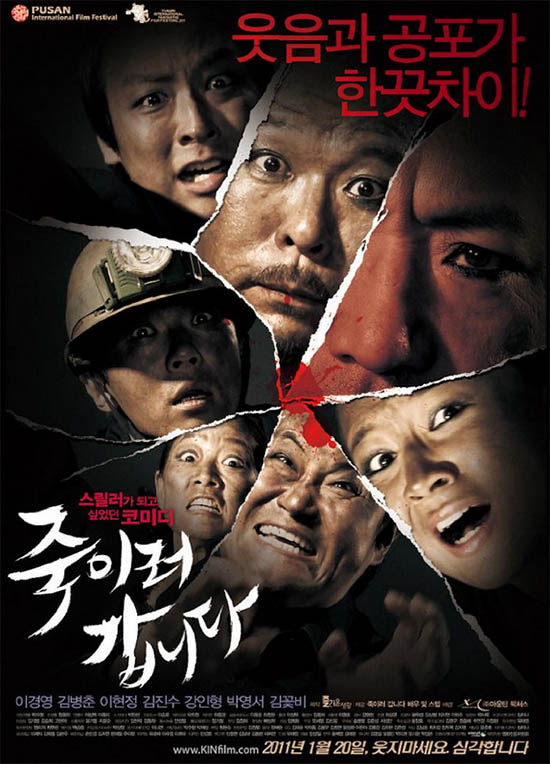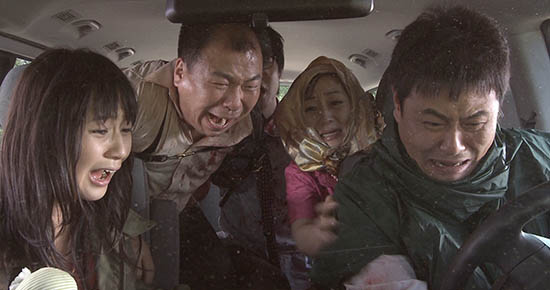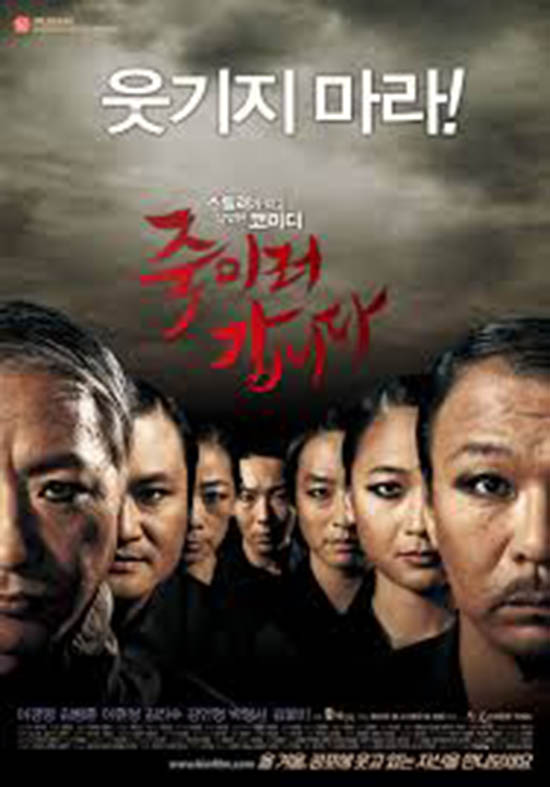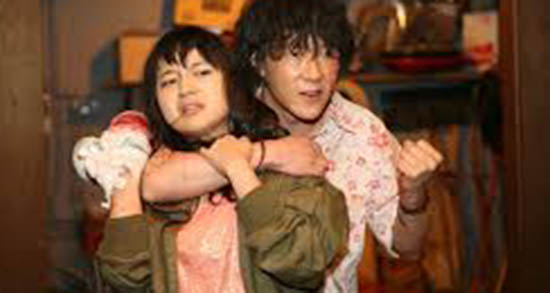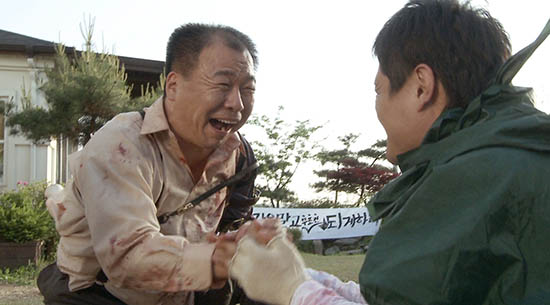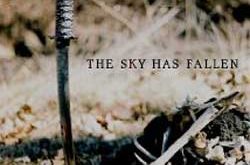SYNOPSIS:
A peaceful family vacation on the mountainside turns deadly when a man’s disgruntled ex-employee arrives seeking a bloody revenge.
REVIEW:
South Korean films hold a very special place in my heart for their predilection toward genre-bending. Films like Madeo (2009) and The Wailing (2016) exquisitely blend elements of drama, horror, intrigue, and light comedy, offering film experiences that feel deeper, more nuanced, and ultimately more reflective of real lives that are rarely constrained to any one genre, even as the fantastic aspects of the films may require a more robust suspension of disbelief.
This capacity for genre-jumping is especially evident when blending cinematic approaches that seem in direct contradiction to each other.
Director Park Soo-young’s 2009 indie slasher-comedy Be My Guest features an eclectic mix of slapstick, horror, black comedy, action, and cynical family drama.
The film centres around a family headed by Mr. Uhm (Kim Byung-choon), a company President who is used to wielding great responsibility. At the start of the film, Uhm, his wife, Mrs. Oh (Lee Hyun-jeong), their two children, Joo-hyeon and Tae-hyeon (Kim Kkobbi and Kang In-hyeong), and his brother, Min-ho (entertainingly portrayed by Kim Jin-soo) are heading up to what seems to be their vacation home somewhere on the mountainside. They all believe that they are going to indulge in an idyllic holiday surrounded by nature, enjoying the company of familial loved ones.
This being a horror film, things do not go as planned.
The setting of the film is gorgeous – lush, green mountains fill the backdrop of many scenes. Despite these bounties of nature, Min-ho foreshadows the carnage to come when he remarks that people are killed in just these sorts of settings in horror movies, name-dropping Friday the 13th in particular. Though the rest of the family scoffs at this observation, clues begin to pile up that they may not be alone on their property – Joo-hyeon spots something suspicious through the lens of her camera and later stumbles upon a seemingly abandoned vehicle that is full of ominous-looking tools, cords, and ropes. As she moves away from the car, we’re shown the reflection of a man holding a giant machete.
Friday the 13th, indeed.
When the violence begins shortly after this scene, it is brutal, relentless, and escalates shockingly quickly. The attacker is revealed to be Mr. Kim, a disgruntled former employee of Uhm’s company who is hellbent on the bloodiest revenge imaginable. As the film continues, the dichotomy of victims v. perpetrator begins to shift in interesting ways. The arrival of a hapless delivery-person (Park Yeong-seo) leads to unexpected and life-changing complications.
The violence and frenetic pacing of the film is punctuated by quiet moments in which we explore the family dynamics, particularly between the brothers. The older brother does not understand the younger’s interest in comics and bristles at the idea of investing in his proposed cinematic adaptation of a popular web comic. The younger one resents the older’s skepticism. The themes of ambition and hard work are repeatedly underscored in the film by multiple characters, who use these ideas as their motivation to both punish other characters and ultimately try to redeem themselves.
The violence, while gory, doesn’t strive for realism. Instead, it aims for an over-the-top absurdity that is well-matched by the comedic performances and often sardonic script. For every scene of dismembering, there is a sequence of slapsticky fighting or superlatively clumsy stumbling. Lee Kyeong-yeong alternates between genuinely menacing and bizarrely joyful as murderous ex-employee Kim. At times, he seems genuinely delighted by the family’s struggles to survive his reign of terror.
The soundtrack is made up of a series of library tracks, ranging from tango to rock to French accordion music to ska and often bizarrely mismatched to the action on-screen. This adds to the sense of heightened reality and the overall comedic nature of the film, even during action sequences. The camerawork adapts to fit the tone of any given scene. At one point, as Min-ho contemplates an act of self sacrifice to save the family, he is featured in the centre of an epic Michael Bay style spinning shot, set to a heroic instrumental.
The film concludes with a blistering, action-(and humour-)packed finale set in a nearby abandoned factory which takes up essentially the entire third act. I did find myself craving more character development and plotting during this time, but the final outcome of the story was satisfying overall.
Rating: 6 out of 10 rusty hacksaws.
 Horror News | HNN Official Site | Horror Movies,Trailers, Reviews
Horror News | HNN Official Site | Horror Movies,Trailers, Reviews
